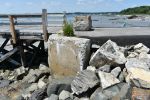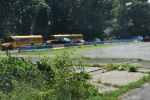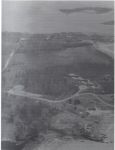Fort Foster: Difference between revisions
J. Malcolm (talk | contribs) mNo edit summary |
J. Malcolm (talk | contribs) mNo edit summary |
||
| (One intermediate revision by the same user not shown) | |||
| Line 1: | Line 1: | ||
Loc. 148 Fort Foster was an Endicott era fort on Gerrish Island in Kittery ME. It was used through WWII.'''This page is being re-written. Excuse our mess.''' | |||
Fort Foster was | |||
== 1870s Era == | == 1870s Era == | ||
Latest revision as of 20:40, 7 December 2024
Loc. 148 Fort Foster was an Endicott era fort on Gerrish Island in Kittery ME. It was used through WWII.This page is being re-written. Excuse our mess.
1870s Era
In 1873 a brick-and-mortar battery was built about where Battery Bohlen sits today. It would have had twelve guns and was named Battery Berry but was never completed. The Battery was abandoned in 1879. There are no remains of the structure as it was destroyed for Battery Bohlen.
Endicott Era
The fort was refortified during the Spanish American War with the construction of Battery Bohlen in 1899. The battery was complete in 1902 named after Henry Bohlen and had three 10 inch Disappearing Rifles. The battery was built over the location of the 1870s battery. From 1917-1919 no guns were mounted on Battery Bohlen. Battery Chapin named for Edward Chapin was completed in 1904 with two 3-inch guns on pedestal mounts. Many post structures came and went during this time. In 1909 a secondary mine station was built behind the battery. It consisted of two levels with one observation level on top. The tower was used in conjunction with the similar station at fort Stark. Eventually the Mine Station would be built at Fort constitution. In 1920 a CRF (Coincidence Range Finder) station was built on top of the battery's magazines. In 1922 a searchlight shelter was built next to Battery Bohlen.
Battery Bohlen
Construction began in 1899 on a three-emplacement gun battery on the site of the 1870s battery. It would have 10-inch M1895 disappearing rifles on M1896 carriages. During WWI the guns were dismounted for use in France. Guns were reinstalled in 1919.
Battery Chapin
World War One
World War Two
During WW2 Fort Foster would be the only Portsmouth fort to be added to during WW2. Battery Construction 205 was initially going to be built on top of Battery Bohlen but instead was built on its own separate ground. The proposed name was to be Battery Curtis, but it was never officially named. This was Battery #5 on defense charts. The battery was completed in 1944 and was to have two 6-inch guns but the tubes never arrived, and the battery was deactivated at the wars end. The 1943 Battery Commanders station for the structure resembled a typical FC Tower at the time and did include a Base-End Station for the Mine Group Commander along with the Battery commander's station. In 1942 a Mine Casement and three-story Double Mine Tower were built near Battery Bohlen. Another battery AMTB 952 was built in front of Battery Bohlen with two 90mm fixed mount guns. The ammunition for this battery was actually stored in the magazines of Battery Bohlen which had its guns scrapped in 1942. Another mobile AMTB Battery 352 was built near Battery 205 with 37mm guns (later Anti-Aircraft Guns).
Battery 205
Battery AMTB 952
Present
- Fort Foster Today
-
Fort Stark
-
1942 Rebuilt Peir
-
Foundation
-
Fort Foster Ariel 1996
The fort officially closed in 1948 and all wooden structures were removed including the Wooden Mine Station behind Battery Chapin. The Navy used the fort for a little bit in the 1950s who removed the earth berm on Battery Chapin (Scrapped in 1945). The fort became a park, and all the batteries and other structures were closed. In the 1980s the magazines of Battery Bohlen were filled to make the gun loading platforms level with the ground. The first floor of the Double Mine tower was converted to a bathroom. The concrete pillar from the wooden Mine Observation Station remains behind Battery Chapin. All post buildings were salvaged after the war and no guns remain. Located at Fort Foster State Park. Admission is charged at the front gate.
SOURCES and REFERENCES
northamericanforts.com
wikipedia.org
fortwiki.com
fortfoster.weebly.com
Jack P. Wysong The World, Portsmouth and the 22nd Coast Artillery Pictorial Histories Publishing Co. 1997



